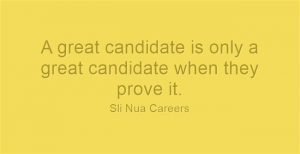By Liam Horan, Career Coach & Managing Director, Sli Nua Careers

The best candidate doesn’t always get the job, writes LIAM HORAN, CAREER COACH, SLI NUA CAREERS.
As so many sports teams have found to their cost, complacency is an insidious virus that attacks without notice and can be extremely difficult to combat.
If you live long enough, you will almost certainly encounter situations in your own life where complacency proved your undoing. Complacency is so easy to spot through the rear view mirror: before it reveals itself, it has a wonderful capacity to hide away in the dark shadows.
When you see it, it’s often too late.
 In sport, the other team – unheralded, unloved, unfancied – has gone six points ahead and you’re wondering how you’re going to pull this one back from the brink.
In sport, the other team – unheralded, unloved, unfancied – has gone six points ahead and you’re wondering how you’re going to pull this one back from the brink.
In an interview, you realise you’re not properly prepared when the third question in a row throws you. You can’t dig out the right answer. You don’t have the ideal example at the ready.
You fail to anticipate the downside of your claim until you’ve said it – and while the interview panel might not reveal their reaction, you know that inside they’re frowning. For interview panels, the sight of a good candidate performing poorly can be a real downer. Some members of the panel may have identified you beforehand as someone who could fit the bill only to be disappointed by what they see.
Interviews are like football matches: they can be (to quote John McGahern) ‘tricky yokes’ to rescue.
I speak from bitter experience. At least once – and perhaps twice if I’m being really honest – I blew it in interview. In the first, most painful instance, I was fully conscious of how poorly I was doing. I knew I was tanking. It felt like one of those dreams you’re trying to escape but, despite your frantic battling, you can’t wake up.
At one stage, I seriously thought about making my excuses, getting my coat and leaving. I didn’t, but, having walked in the door confident I was ‘the man’, I walked out full in the knowledge that I wouldn’t be getting the job.
I didn’t get the job.
I thought I was ‘the man’ – but I hadn’t got my stuff together. I hadn’t focused enough on the job at the hand. While I felt I was ‘the man’, I hadn’t put in the work to anticipate what the panel wanted in the winning candidate.
Confidence is vital. If you don’t believe you can do the job, you’ve no business being there. But a surplus of confidence can render you arrogant and ill-prepared. It can allow you to fall back on your record to date without making the crucial leap of illustrating howyour experience, skills, qualifications, training and attitude can be put to good effect in the next job.
Head-hunted candidates often exhibit complacency. They think they’re home and dry. They get distracted about the salary or other conditions of the contract before they’ve nailed down the job: this is the equivalent of wondering where you will park the curtain side trailer for the homecoming before you’ve played the county final.
A great candidate is only a great candidate when they prove it. Do your work beforehand. Get yourself right. Presume the opposition will be exceptional. Bring some of the underdog’s bite to the interview. It will serve you well. The homecoming will take care of itself.
If you would like to make a booking with any of our career coaches, see HERE for CV Preparation and Interview Training.
